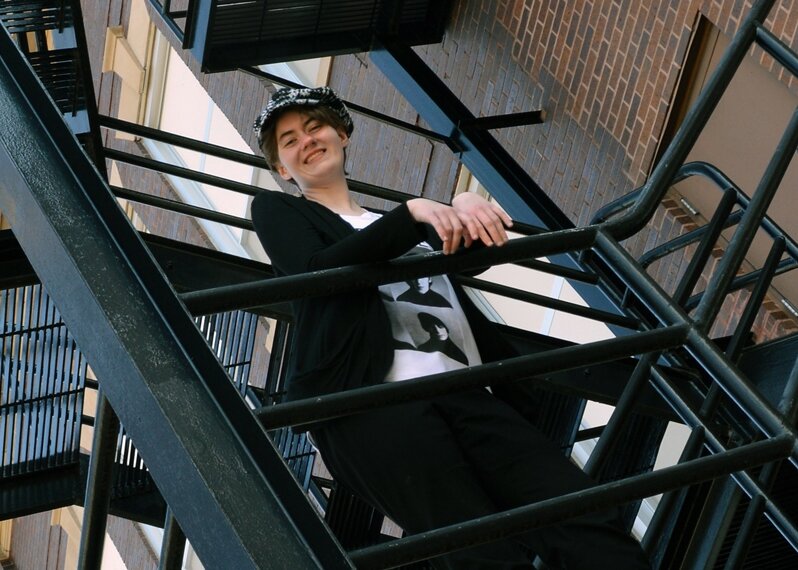 Emily K. Michael
Emily K. Michael
When Emily K. Michael approached Primal School about a possible interview back in May, saying that she was interested in “the tension between performance and page, and the presence of other voices (human and non-human),” I was intrigued and embarked on a lightning tour of the work of hers that was available on the web. In her eye for the world’s beauty as well as her candor in speaking about her life as a blind person, I sensed the stirrings of a rich conversation. I suggested we talk about her poem “A Phenomenology of Blindness” (originally published in Rogue Agent), with its implicit advocacy and benign but frank exploration of prejudice. I felt committed to exploring thoroughly the machinations of the poem’s central idea and was grateful for Emily’s willingness to go there with me. Discussing her work, Emerson's words came to mind: “It is not meter, but a meter-making argument that makes a poem, a thought so passionate and alive that like the spirit of a plant or an animal it has an architecture of its own, and adorns nature with a new thing.” — HLJ
===
I don’t normally begin interviews by asking poets about their titles, but I’d like to begin there because of the truth claim inherent in this poem’s title. The poem is intended to be a “phenomenology.” How did the poem and idea arrive?
I suspect that this poem has been a long time coming. It responds to the intense curiosity that I often sense in others, even when it's not directly expressed. People hear that I'm blind or see me traveling with my guide dog or stopping to read the braille on the elevator, and they start firing off questions: "Is it like this? Is it like that? I bet it's like this!" So, when a colleague of mine said she was having trouble writing a blind character, I sat down and wrote this poem.
I wanted to say, "Look, it's not like any of these things." Because others’ speculation and theorizing is done in my absence — or it's done as if I'm not standing there…when I am. Whether it's a portrayal of disability in the media or an actual stranger confronting me at the coffeeshop, nondisabled people seem to take hold of stories of disability without asking us what's really going on.
"Phenomenology" seemed like the right name for a catalog of experiences that weren't what blindness is at all. And that's how the poem helped me to say that blindness isn't all of these things, but it also isn't One Thing. It isn't one story. It's this wild unruly mosaic that's part of my life.
===
A PHENOMENOLOGY OF BLINDNESS
It’s not like walking through life with your glasses off.
I mean, sometimes we wear glasses, but they’re different
from yours. Thicker, broader, darker. And they don’t
work the quotidian miracle of correctable vision.
It’s not like getting your eyes dilated once a year, staggering
out to the car under those stiff black shades with the sharp edges,
tearing up beneath the merciless sun and wondering how you’ll manage
the drive home. Damn, someone just texted you and you can’t read your phone.
It’s not like groping in the dark when you come home late
and you can’t find your keys because you and your girlfriends
had too many pomegranate martinis. I know it was a birthday,
but if you could think clearly, you’d know where your keys are.
It’s not like leaving the nail salon after a pedicure, shuffling forward
in disposable flip-flops, doing everything you can not to chip that
gorgeous raspberry shimmer polish. It’s not like that at all.
It’s not like feeling faint because you forgot to eat lunch — you were
working so hard you couldn’t even stop for a granola bar, so you
cling to your colleague’s arm as he guides you outside. It’s nice
to have support, you think, nice to know he doesn’t mind helping.
It’s not convenient, popular, or cumbersome. It’s not a filter
that you can slide over the world, not a stylish coat hanging
in your closet. I, too, am waiting for winter because I love
wearing my coats — peacoats, swing coats, blazers. I have
so many! It’s just that blindness isn’t one of them.


